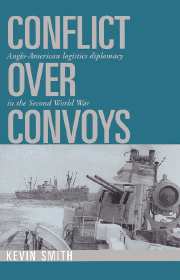Book contents
- Frontmatter
- Contents
- List of maps
- List of tables
- Preface
- List of abbreviations and codewords
- Introduction
- 1 “Not what it could or should be”: Britain's shipping situation
- 2 “Beyond our power without your help”: Britain's Battle of the Atlantic
- 3 “But westward, look, the land is bright”: American shipping assistance from neutrality to belligerency, March 1941–November 1942
- 4 Roosevelt's promise: “your requirements will be met”
- 5 The Casablanca Conference and its aftermath: a “most curious misunderstanding”
- 6 Reaping the whirlwind: the perils of impending victory
- Postscript and conclusions
- Appendices
- Tables
- Notes
- Bibliography
- Index
3 - “But westward, look, the land is bright”: American shipping assistance from neutrality to belligerency, March 1941–November 1942
Published online by Cambridge University Press: 06 July 2010
- Frontmatter
- Contents
- List of maps
- List of tables
- Preface
- List of abbreviations and codewords
- Introduction
- 1 “Not what it could or should be”: Britain's shipping situation
- 2 “Beyond our power without your help”: Britain's Battle of the Atlantic
- 3 “But westward, look, the land is bright”: American shipping assistance from neutrality to belligerency, March 1941–November 1942
- 4 Roosevelt's promise: “your requirements will be met”
- 5 The Casablanca Conference and its aftermath: a “most curious misunderstanding”
- 6 Reaping the whirlwind: the perils of impending victory
- Postscript and conclusions
- Appendices
- Tables
- Notes
- Bibliography
- Index
Summary
It soon became evident that the weakest link in the chain of the British war effort might be sea transport … only in America, if anywhere, this weakness could be repaired.
Sir Arthur Salter, Head of British Merchant Shipping Mission in Washington, 1941–1943The battle of the Atlantic has begun. The issue may well depend on the speed with which our resources to combat the menace to our communications with the Western Hemisphere are supplemented by those of the United States of America … Of all our needs none is more pressing than that of obtaining from the United States the assistance which we require in the matter of merchant shipping.
Churchill commissioning Salter to go to Washington, 12 March 1941Britain's shipping shortage sparked pleas from 1941 onward for increased American shipbuilding and for shipping allocations to service British routes. Lend-Lease enhanced British shipping capacity during 1941 in other respects by easing the burden on British port management, food supplies, and repair yards. Churchill hoped its greatest contribution would be to facilitate transferral of American ships to British control. Hence his decision to send Britain's most experienced shipping bureaucrat to Washington just one day after Lend-Lease was enacted. Sir Arthur Salter's Merchant Shipping Mission was the main conduit for Anglo-American haggles over merchant shipping. In this “logistics diplomacy,” Britain begged for aid from a reluctant American benefactor.
- Type
- Chapter
- Information
- Conflict over ConvoysAnglo-American Logistics Diplomacy in the Second World War, pp. 64 - 96Publisher: Cambridge University PressPrint publication year: 1996



